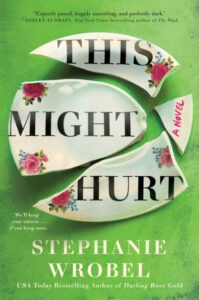Writing novels is an excuse to immerse myself in my obsessions. Research is my favorite part of writing prep, and I am one-hundred-percent guilty of continuing to read and take notes long after I know a subject backward and forward.
My second novel, This Might Hurt, is about a cult, and I pursued this topic with typical gusto. These unusual communities have always enthralled me. I didn’t know it at the time, but whenever I picked up a cult novel, I was trying to figure out two things: why would someone start a cult? Perhaps more importantly, why would someone join one?
The more cult novels I read, the less I felt these questions were being answered. Often the cult was more of a plot device than anything; I couldn’t picture myself or anyone I knew getting wrapped up in these fictitious societies. Yet real people did and do join cults all the time. I turned to nonfiction, and there, I found the answers I was looking for.
If you, too, are thinking of writing a novel about a cult, let me make the task a little easier by sharing a handful of the best resources I stumbled upon. Below are my top nonfiction book picks for writers preparing to dive deep into cults—or for the lay reader who wants to do the same.
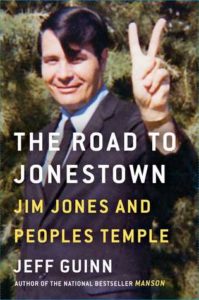
The Road to Jonestown: Jim Jones and Peoples Temple by Jeff Guinn
Guinn exhaustively covers not only the history of the Peoples Temple, but also its leader, Jim Jones, taking the reader all the way back to his childhood. We learn Jones’s quirks, like holding funerals for roadkill as a boy, and, as a teenager, refusing to speak to anyone unless he initiated the conversation. We see the role Jones’s mother played in his development. We get to witness, up close, the techniques Jones used to recruit new members, and how he kept them committed once they’d joined. If you’re looking for a psychology manual on how a cult leader takes shape and thrives, you’d be hard-pressed to do better than this one. Bonus: I also highly recommend listening to Guinn’s interview on NPR’s Fresh Air, which is full of fascinating insights.
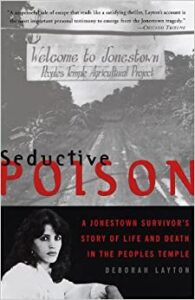
Seductive Poison: A Jonestown Survivor’s Story of Life and Death in the Peoples Temple by Deborah Layton
Layton’s memoir is the best resource I found for understanding how people wind up in cults. She gives a firsthand account of why she joined one—in this case, Peoples Temple again—and why she stayed as long as she did. This story gives you the chance to see a cult leader through a member’s eyes: the initial admiration that often develops into infatuation, which slowly turns to doubt, disillusion, and fear. I found the admiration and infatuation elements the most useful; it’s easy for those of us outside the cult to understand the eventual disillusionment and fear, but it’s much harder to see the allure of these leaders. Layton’s book is an excellent companion piece to Guinn’s, allowing you to read the same story twice but from wildly different perspectives.
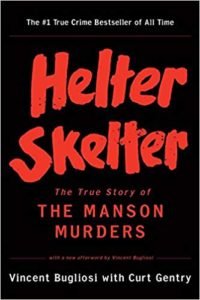
Helter Skelter: The True Story of the Manson Murders by Vincent Bugliosi
Helter Skelter is a classic within the true crime genre, and for good reason: it reads like a novel. As with Guinn’s book, Bugliosi offers readers the chance to peek behind the curtain, to understand how Charles Manson became Charles Manson. By reading multiple biographies of cult leaders, we can note the commonalities between people like Jones and Manson: neglected, narcissistic, unpredictable, power-driven. But to make a cult leader feel real and believable, we can’t mistake them as being interchangeable. Jones, Manson, Applewhite, Koresh, etc. had differing belief systems; they had strengths, weaknesses, and tics specific to their personalities and upbringings. Helter Skelter takes an unblinking look at one of these men.
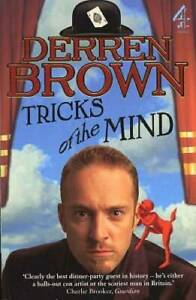
Tricks of the Mind by Derren Brown
I realize the autobiography/magic manual of a British illusionist may not be the most obvious choice for a roundup about cults, but hear me out. Brown spends part of his book explaining what sort of people are most likely to believe—in hypnosis, in magic, in a charlatan promising the world. (Sound familiar?) Brown’s musings on belief and the difficulty of defying authority are also applicable to the relationships found within cults. Finally, he offers tips for being an effective performer—and what are cult leaders, if not masterful performers?
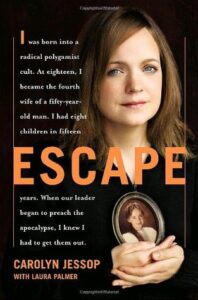
Escape by Carolyn Jessop
Jessop is a former member of the Fundamentalist Church of Jesus Christ of Latter-Day Saints, or FLDS. If you’re interested in writing a story about a religious cult or polygamist sect, Jessop gives you an uncomfortable but powerful look into daily life inside one. She spends much of the book recounting the difficulty of extricating herself from the cult, so if your novel has an escape element to it, Jessop’s story is a good one to read.
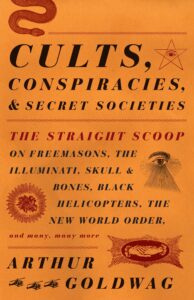
Cults, Conspiracies & Secret Societies: The Straight Scoop on Freemasons, The Illuminati, Skull and Bones, Black Helicopters, The New World Order, and many, many more by Arthur Goldwag
What sort of research guide would this be without a reference manual? In truth, I found the resources I’ve already mentioned more helpful than this one, but there is information to be gleaned here too. Most useful to me were Goldwag’s three characteristics of cults: 1) a charismatic leader who becomes an object of worship, 2) a process of coercive persuasion, and 3) psychological, economic, and/or sexual exploitation of members by leaders. These days, it’s easy to accuse anything with a zealous following of being a cult, but I think it’s important to know what the textbook definition is before attempting to create one ourselves.
The more I studied cult leaders, the more familiar their personality traits sounded. I realized I had written a narcissist before—Patty Watts was one of the narrators of my first novel, Darling Rose Gold. Patty has Munchausen syndrome by proxy (now known as Factitious disorder in another), which meant she was cunning, manipulative, and charismatic. Upon identifying the overlap between cult leaders and people with FDIA, I was able to apply some of Patty’s tricks to Teacher, Wisewood’s fearless founder. Despite Patty’s and Teacher’s commonalities, I suspect most readers would never confuse them; to me, they feel nothing alike. In research, narcissists tend to sound quite similar. In literature, they can—and should—be as varied as writers themselves.
***


